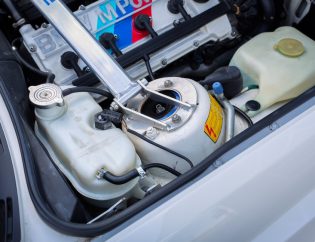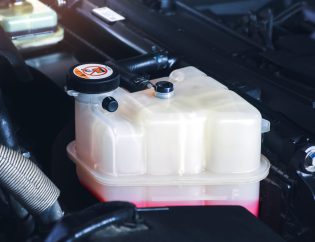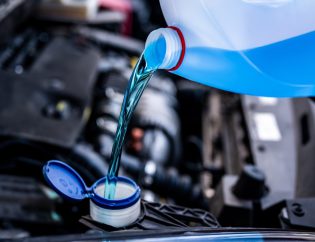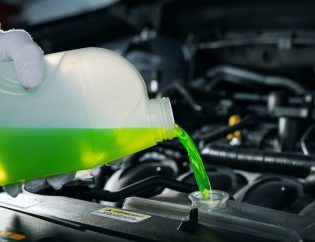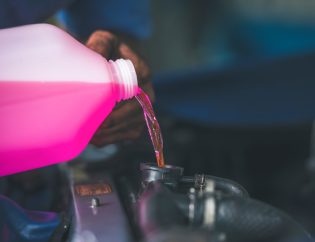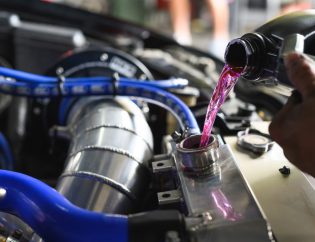
When most drivers experience an alarming cascade of red warning lights and rising temperature gauges on their dashboards, their first instinct is to reach for whatever liquid they have on hand in hopes of quickly resolving the overheating issue.
However, pouring oil into an empty coolant reservoir is not advisable and should only be considered an absolute last resort in extreme circumstances.
Before deciding whether oil can be substituted as coolant, it’s important to understand what these vital automotive fluids do and why they should never be mixed.
They are making the wrong choice when your engine overheats, which could lead to leaked seals, corrosion, clogged passages, and the eventual failure of internal components.
This brief guide by Azure will examine the key differences between oil and coolant, look at potential risks, and provide recommendations for properly handling overheating episodes.
Contents
- 1 What is Engine Coolant?
- 2 What is Engine Oil?
- 3 Key Differences Between Oil and Coolant
- 4 Can Oil Be Used as Coolant in an Emergency?
- 5 Risks of Using Oil as Coolant
- 6 Signs of Engine Damage from Using Oil as Coolant
- 7 How to Properly Flush Oil Coolant
- 8 When to Consult a Mechanic
- 9 Frequently Asked Questions
- 10 Conclusion
What is Engine Coolant?
Antifreeze, another name for engine coolant, is a liquid that runs through the radiator and engine to keep them from overheating.

Its main purposes are:
Keep the Engine at Optimal Operating Temperature.
Excess heat from the engine is taken up by the coolant and transferred to the radiator so it can cool down. This prevents overheating.
Prevent Freezing
In cold weather, coolant helps prevent ice from forming and damaging engine components by lowering the freezing point of the water-based solution.
Prevent Corrosion
Most coolants contain anticorrosion additives that form a protective coating on the internal metal surfaces of the cooling system. This prevents rust and decay over time.
There are a few main types of engine coolant:
Ethylene Glycol
The most common type. Provides good heat transfer and freeze protection. Drawbacks are toxicity if ingested and requiring disposal.
Propylene Glycol
A safer but less efficient alternative to ethylene glycol. It lowers toxicity and is more biodegradable, but it doesn’t cool as effectively.
Organic Acid Technology (OAT)
Extended life coolants lasting five or more years. Contains organic acid inhibitors and fewer inert minerals. More recyclable but expensive.
Hybrid Organic Acid Technology (HOAT)
Combine organic acids with traditional glycol-based coolants. Provide long life with more flexibility for mixing with other types—a good compromise.
Overall, ethylene glycol offers the best performance, propylene glycol is safer, and OAT/HOAT coolants provide longer service intervals before needing to be replaced. The optimal choice depends on your specific vehicle and needs.
What is Engine Oil?
In order to maintain enough lubrication of the engine components and avoid excessive friction and heat buildup from metal-on-metal contact, engine oil is used in internal combustion engines. The key purposes of engine oil are:
- Reducing friction – The oil forms a protective film between moving parts to minimize friction and wear. This allows the engine to run smoothly.
- Cooling – The oil absorbs and dissipates heat from combustion and friction. This prevents overheating.
- Cleaning – The oil helps suspend contaminants and dirt that can build up inside the engine so they can be filtered out. This prevents sludge and deposit formation.
- Preventing corrosion – The oil coats engine parts to prevent rust and corrosion damage over time.
- Sealing – In order to maintain enough lubrication of the engine components and avoid excessive friction and heat buildup from metal-on-metal contact, engine oil is used in internal combustion engines.
The most used models of engine oil are:
- Conventional Oil – This mineral-based oil is suitable for most older engines. It provides decent wear protection and affordability but may need more performance in extreme temperatures.
- Synthetic Oil – Synthesized from chemicals, this oil can withstand extreme temperatures. It provides superior protection and cleaner operation but costs more.
- Synthetic blends mix conventional and synthetic base oils to balance protection, performance, and cost. They are suitable for many modern engines.
- High mileage oils contain extra seal conditioners and anti-wear additives to compensate for worn engines.
Overall, synthetic oils provide the best protection and performance. But conventional oils can be a more budget-friendly option for routine maintenance in less demanding conditions. The right oil depends on vehicle make and model, mileage, and driving conditions.
Key Differences Between Oil and Coolant
Because of their highly distinct qualities, engine oil and coolant are both appropriate for the purposes for which they are used in automobiles.

Here are some of the key differences:
Boiling Points
The boiling point of engine coolant is typically 105–129°C, depending on the mixture. This high boiling point allows it to absorb much heat from the engine. In contrast, engine oil has a much lower boiling point, around 300–400°C. Oil can boil off at high temperatures and lose its cooling properties if it is used as a coolant.
Thermal Conductivity
Coolant is designed to remove heat from the engine with high thermal conductivity efficiently. Oil does not transfer heat as effectively as coolant, which can lead to hot spots in the engine.
Viscosity
Coolant has a lower viscosity than oil at engine operating temperatures. This allows it to flow easily and circulate through all cooling system parts. Oil will not pump and flow as well at high temperatures due to higher viscosity.
Additives
In order to stop rust and scale accumulation in the cooling system, coolant contains chemicals called corrosion inhibitors. Oil does not contain these additives and can lead to corrosion damage over time if used as a coolant. Coolant additives also prevent foaming and provide lubrication for water pumps.
The differences in boiling point, thermal conductivity, viscosity, and additives make oil unsuitable as a direct substitute for engine coolant. Using oil as a coolant can lead to overheating, corrosion, hot spots, and breakdown of the oil itself. Oil and coolant are engineered for different purposes, and using the wrong fluid can cause significant engine damage.
Can Oil Be Used as Coolant in an Emergency?
In dire circumstances, engine oil can be used as a temporary substitute for coolant.

However, this should only be considered an absolute last resort for extremely short-term use in an emergency.
Using oil as engine coolant, even briefly, carries major risks that can lead to severe engine damage. Unlike proper coolant, oil does not transfer heat well and will not properly cool critical engine components. This can quickly lead to overheating issues.
Oil also does not have the same anti-corrosive properties as coolant, meaning it will not prevent rust, corrosion, and mineral deposits from building up inside the cooling system and radiator. This can clog and reduce coolant flow.
If no other options exist, oil should only be minimally added to the cooling system. No more than a quart or two at the most. This may provide brief temporary cooling to limp the vehicle to a repair facility. However, driving any significant distance with oil as a coolant is not recommended, even in an emergency.
The vehicle should be immediately brought in for service once emergency oil usage occurs. To avoid lasting damage, the cooling system must be thoroughly drained, flushed, and refilled with the proper coolant. Using oil as anything beyond extremely short-term coolant is hazardous to your engine. Proper repairs should follow any emergency use of oil as a coolant.
Risks of Using Oil as Coolant
Using oil as a replacement for engine coolant creates several risks that can lead to severe engine damage over time.

Some of the key risks include:
Overheating
Engine coolant is designed to transfer heat away from the engine to prevent overheating efficiently. Motor oil does not have the same heat transfer properties, so the engine is likely to run hotter. Prolonged overheating can warp engine components like cylinder heads and cause gaskets and seals to fail.
Corrosion
Coolant contains corrosion inhibitors to prevent rust and corrosion inside the engine and radiator. Oil does not contain these additives, so corrosion is much more likely to occur when using oil as a coolant. This corrosion can eat away and weaken critical engine parts.
Sludge Buildup
Oil will break down at high engine temperatures. As it breaks down, it leaves carbon deposits and sludge that can clog passages in the radiator, heater core, and engine. This sludge buildup reduces cooling system efficiency.
Oil Breakdown
Motor oil is not meant to operate in the engine cooling system at high temperatures. It will break down rapidly, becoming less effective at cooling and lubrication. This leads to oil leaks and loss of protection for engine components.
Signs of Engine Damage from Using Oil as Coolant
Using oil as a coolant replacement can lead to serious engine damage if driven for any extended period of time.

Here are some key signs that your engine may be suffering damage from oil used as coolant:
Overheating
- The oil will not have the same heat transfer properties as the coolant, leading to rapid overheating.
- The engine temperature gauge rising to very high levels indicates the oil is not cooling the engine properly.
- Lack of proper cooling can lead to warping and cracking of engine components.
Leaks
- Oil does not have the same sealing capabilities as coolant and will likely leak from the cooling system hoses and gaskets.
- Signs of leaking oil around the engine bay, underneath the car, or exhaust smoke may indicate an incorrectly sealed cooling system.
Performance Issues
- Oil residue circulating in the cooling system can clog passages and radiators. This reduces flow and cooling capacity.
- Symptoms like misfires, lack of power, and acceleration issues point to components overheating from insufficient cooling.
- The thickness of oil at operating temperatures also does not allow proper coolant flow, which can cause further component damage.
Proper engine coolant is vital for safe operation and longevity. Using oil as a replacement risks serious engine damage through overheating, leakage, and performance problems. Consult a mechanic immediately if oil was used in place of coolant.
How to Properly Flush Oil Coolant
If you’ve mistakenly used oil as an emergency coolant in your engine, it’s crucial to flush the system properly before refilling it with the appropriate engine coolant. Here are the steps to take:
Drain the Oil
- If the engine was recently ran at full power, let it cool. This prevents burns and facilitates appropriate oil flow.
- Find the drain plug by looking behind the engine block or radiator. Set a pan for draining below.
- Remove the drain plug slowly. Carefully get the drain stopper out. Let the cooling system’s oil completely drain.
- Once the dripping has stopped, replace the drain plug tightly.
Flush the System
- Mix a concentrated radiator flush solution following the product instructions.
- Carefully pour the solution into the cooling system after removing the radiator cap.
- Replace the cap and run the engine until fully warmed up. This circulates the solution and breaks down oil deposits.
- Allow the engine to cool again until touchable. Drain the flush solution just like the initial oil drain.
- Repeat as needed until the drained liquid runs clear.
Refill with Proper Coolant
- After removing the radiator cap, replenish the cooling system with a blend of 50/50 coolant and distilled water.
- Top off until reaching the full line on the reservoir. Replace the radiator cap securely.
- Run the engine again, inspecting for leaks at the radiator, hoses, reservoir, etc. Top up coolant as needed.
- Verify the coolant color and level over the next few days of driving. Top up if necessary.
Following these steps properly flushes the system of old oil and debris, preparing it for fresh coolant fill. Avoid future cooling issues by only using approved engine coolant.
When to Consult a Mechanic
Although using oil as a temporary coolant would seem like a simple solution, if done incorrectly, it can cause major engine damage. Here are some signs that indicate you should take your vehicle to a professional mechanic:
Engine Overheated
If the engine temperature spiked while oil was used as a coolant, internal engine components may be warped or damaged. Do not continue driving the vehicle. Have it towed to a mechanic for inspection.
Signs of Damage
If you notice leaks, smoke from the exhaust, the temperature gauge creeping up, loss of power, or odd noises after using oil as a coolant, the engine may be damaged. Don’t keep driving it in this condition. Consult a professional mechanic immediately.
Lingering Performance Issues
Even after you flush the oil from the system, residues may remain. The vehicle may not run smoothly or overheat easily. Take it to a mechanic if any drivability issues persist.
Due for Coolant Replacement
Standard coolant lasts 2-5 years. If it’s time to replace your coolant, have a mechanic flush the system when installing new coolant. Make sure to do routine maintenance.
Using oil as coolant can seem like a quick fix, but it often creates lasting damage. After this attempted emergency repair, consult a professional mechanic at the first sign of engine problems. Stay away from driving a damaged vehicle and risk further issues down the road.
Frequently Asked Questions
Can Engine Oil be Used as a Coolant in My Vehicle?
No, engine oil should not be used as a coolant. Engine oil and coolant serve different purposes and are formulated differently. Using engine oil as a coolant can cause significant damage to your vehicle’s engine.
What is the Primary Function of Engine Oil?
Engine oil lubricates the engine’s moving parts, reduces friction, protects against corrosion, and helps keep the engine clean by preventing the buildup of contaminants.
What is The Primary Function of Coolant?
The primary function of coolant, or antifreeze, is to absorb heat from the engine and dissipate it through the radiator. It also helps prevent freezing in cold temperatures and protects against corrosion in the cooling system.
What Could Happen if I Use Engine Oil as a Coolant?
Using engine oil as a coolant can lead to inadequate cooling of the engine, resulting in overheating. This can cause severe engine damage, including warped components and engine failure.
Conclusion
Using oil as a replacement for coolant is not recommended under any circumstances. While it may seem like a quick fix in an emergency, it can lead to severe engine damage. Here’s a recap of the key reasons oil should never be used as coolant:
- Oil and coolant have completely different purposes. Coolant is designed to transfer heat while oil lubricates moving parts. Using oil as a coolant will lead to overheating.
- Oil does not have the same antifreeze and anticorrosion properties as coolant. It cannot prevent freezing in cold temperatures or corrosion inside the engine.
- Oil can turn into sludge or gel at high engine temperatures. This can clog up internal engine components and cause them to fail.
- Trying to flush out oil from the coolant system is extremely challenging. It would help if you usually had a complete flush at a mechanic shop with special equipment.
- Using oil as coolant inevitably voids any engine warranty you may have. No manufacturer will cover damage from improper maintenance like this.
The hazards of utilizing oil as a coolant are much greater than any potential advantages. In the event of a coolant emergency, seek the advice of a qualified mechanic rather than attempting such improvised fixes. Proper maintenance and care ensure your vehicle’s cooling system operates smoothly. But putting oil in place of coolant will lead to certain engine damage. Need quality coolant for your vehicle? Contact Azure to schedule your delivery.

